Infrastructure as a Service for Small Businesses
Choosing the right infrastructure for your business might just be what sets you apart from businesses that fail. Many business owners have been turning to cloud-based infrastructure, as they offer affordable, secure business infrastructure solutions. These solutions allow you to take your business to the next level with integrated cloud computing functionality.
Though the grass isn’t always greener on the other side. Some cloud computing solutions reduce your control over the data being processed, and come with bandwidth or redundancy issues. That’s why we picked five solutions that go above and beyond when it comes to handling data and processing speeds. Depending on how you implement a solution, you may find that some of these solutions are more redundant and faster than your current infrastructure. It’s possible to achieve all of this without heavy spending or compromise to your data handling.
IaaS Solutions for Small Businesses
It’s a lot more common to find IaaS solutions for small businesses these days. The 5 IaaS solutions discussed in this article are:
What is IaaS?
IaaS is a cloud-based solution that provides businesses with reliable, scalable, and cost-effective infrastructures. These infrastructure solutions can run apps, websites, and other digital services.
For more information about what IaaS is, check out our blog post “What is Infrastructure as a Service”!
Benefits of Using IaaS Solutions
IaaS service providers remove the need for physical servers and infrastructure, which create a number of benefits for small business customers.
Only pay for what you need.
Physical infrastructure components can be costly to buy, install, and maintain. This might be an obstacle for small businesses that are budget constrained. An IaaS solution can spin up virtualized servers that scale with use, so you only have to pay for what you need. This aspect of IaaS makes it the most cost-effective solution for your infrastructure.
You won’t need to maintain or upgrade your infrastructure pieces.
Another benefit to consider is that the service provider handles all of the infrastructure components. Many small businesses don’t have the means to constantly upgrade infrastructure pieces as needed. This effectively reduces your maintenance and upgrade costs, and removes another headache brought on by physical infrastructure components.
Strong data and infrastructure security.
Businesses are entrusting sensitive data to the IaaS provider. This means the IaaS providers will invest heavily into infrastructure and data security. Some IaaS providers also include security resources, such as security experts, which can aid in securing your infrastructure. These resources could be invaluable to small businesses that might struggle with securing the data generated by the business.
Data is more accessible.
In today’s tech landscape, access is just as important as efficiency or security. The data processed by the infrastructure services is stored in the cloud, so it is easier to access the data from anywhere. All you need is an internet connection. This provides more flexibility to small business teams as they can access data and infrastructure from anywhere.
Better disaster recovery.
Disasters involving data can prove fatal for many businesses, especially those lacking the resources to properly recover data. With an IaaS solution, you can proactively plan for disasters. These solutions promote business continuity and reduce critical losses due to outages and other troublesome events.
Data recovery.
Cloud storage can also allow you to synchronize with any changes made from endpoints. This means your data will be backed up into the cloud and can be easily accessed with an internet connection.
Faster development.
Developers can start the development process as soon as the digital infrastructure pieces are provisioned. This saves a considerable amount of time as opposed to having the developers wait for physical machines to be set up first.
Which type of IaaS Solution Right for Your Business?
There are three main options to choose from when considering which type of IaaS cloud solution would be best for you: public cloud, private cloud, and hybrid cloud.
Public Cloud: Public cloud is the most common type of cloud deployment. In this instance, cloud computing resources are shared between multiple organizations.
Private Cloud: Private cloud deployments offer a bit more exclusivity, as the cloud resources are provisioned solely for one organization.
Hybrid Cloud: Hybrid cloud setups utilize on-premise hardware that has the ability to scale up into public cloud resources in the event of overflow.
With this in mind, which type of cloud-based IaaS solution should you consider for your business? The answer ultimately depends on your use case!
Different IaaS Use Cases
IaaS provides a variety of solutions for IT, data, and networking needs. Some of the most popular use cases for IaaS solutions include the following:
Disaster recovery & Data backup
IaaS solutions create an easy option for storing files and building data backups. IaaS services allow you to consolidate your disaster recovery systems into one centralized location with a few steps. This makes your business data easier to secure, back up, and recover.
Program testing and development
Resources such as virtualization, computing, and networking make IaaS solutions ideal for testing and development lifecycles. These resources are also intended to scale with need, making them perfect for complex development projects.
Hosting complex websites
Another benefit derived from the scalable nature of IaaS solutions is complex website hosting. If you have a website that requires considerable network resources or sees large fluctuations in digital foot traffic, you should consider an IaaS solution.
Big data collection and analysis
Many businesses generate massive amounts of data which is used for business intelligence (BI). An IaaS solution would work well if this fits your business use case because it can detect, store, and analyze big data. Some solutions even allow you to integrate BI tools to generate actionable insights from the data you collect.
Networking
Networking is another area where IaaS solutions are making a huge impact. When your business grows, so do your networking needs. An IaaS solution can handle the provisioning of resources based on your real-time need for them. This could also be beneficial for organizations that might need IT staff freed up for other tasks and projects.
The Best IaaS Solutions for Small Businesses
There are many IaaS solutions available to small business owners. The top 5 best IaaS solutions for small businesses are:
- Linode
- AWS
- DigitalOcean
- Google Compute Engine
- Microsoft Azure
Linode

Linode is a cloud-based infrastructure provider that uses Linux virtual machines to develop, deploy, and scale an organization’s applications. Deployed across 11 global markets, Linode offers a cost-effective infrastructure solution that comprises many different services.
Cost:
Linode does offer a free trial with a 7-day full refund offer. A comprehensive list of prices for Linode can be found on the Linode Pricing Page.
Free Cloud Bundle:
Linode offers a free cloud bundle which allows access to a handful of cloud services for free. These services include DDoS protection, private networks with VLAN, configurable firewall rules, DNS management, monitoring, various deployment methods, IPv6 support, and access to the app marketplace.
Use Case: Linode’s Free Cloud Bundle offering allows small businesses an opportunity to try out cloud networking services without overcommitting to a provider. Other users have mentioned that Linode also provides notable cloud solutions for complex web hosting and program testing/deployment.
Linode is an excellent choice for small businesses looking to take that first step into cloud computing solutions.
Distribution and Market Share:
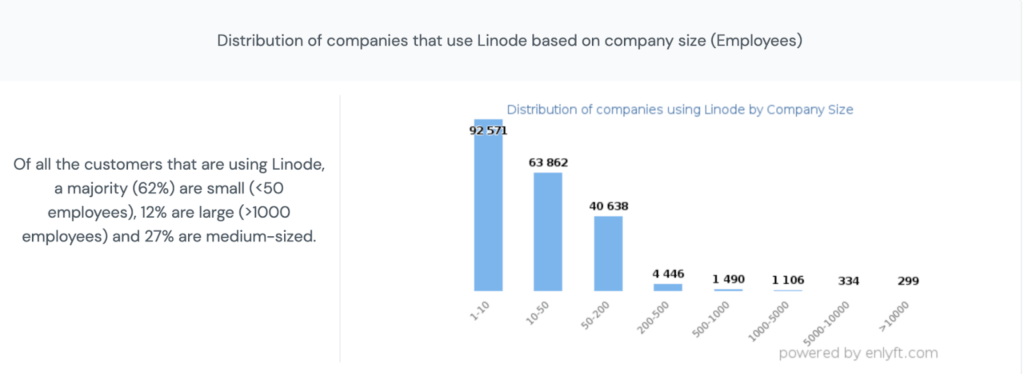
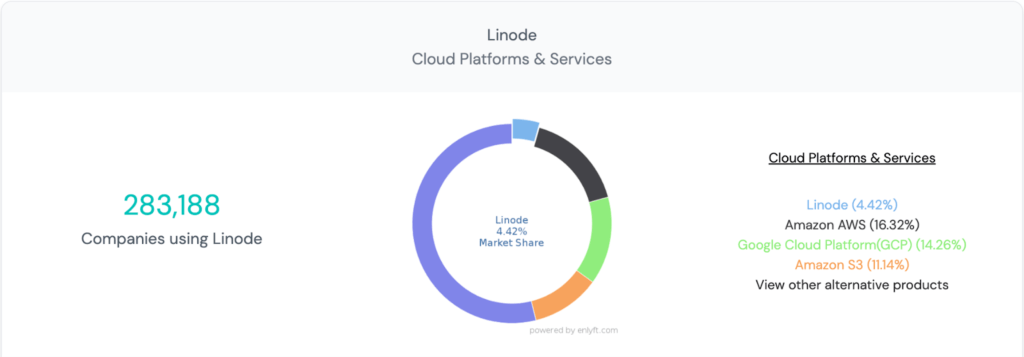
Graphs provided by enlyft.com
AWS (Amazon Web Services)

Amazon Web Services (AWS) is currently the number one leading provider of cloud computing infrastructure services. Amazon offers over 165 different services in its infrastructure and computing suite. Amazon also boasts a wide area of service coverage, providing its services over 69 Availability Zones across the globe.
Cost:
AWS offers a free trial. Amazon offers an AWS Pricing Calculator which can be used to estimate how much a set up with its services will cost.
Think Big for Small Business (TBSB) Program:
AWS offers this program which is geared towards minority-owned and small businesses. This program gives qualifying businesses access to business, technical, and market support.
Use Case: Amazon Web Services is a good all around solution for cloud infrastructure. AWS provides huge network coverage and excels at collecting big data for analysis. Users also mention AWS provides solid data storage, security, and accessibility and makes it easy to deploy applications on the AWS infrastructure.
AWS is a good choice for most cloud computing use cases.
Distribution and Market Share:
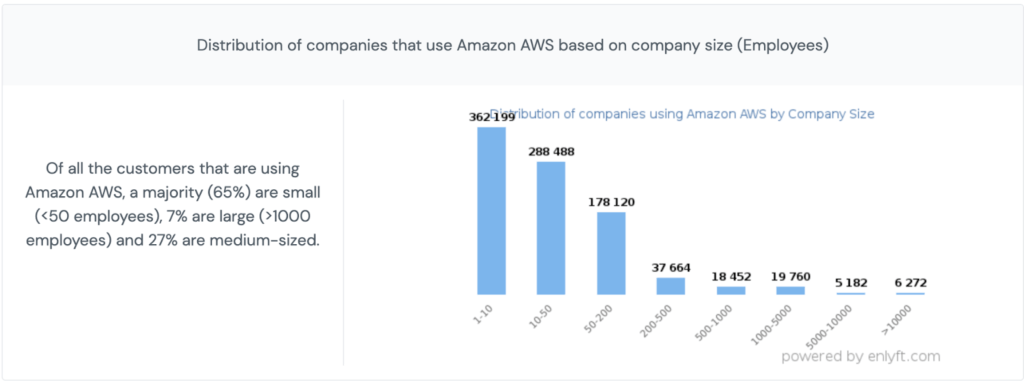
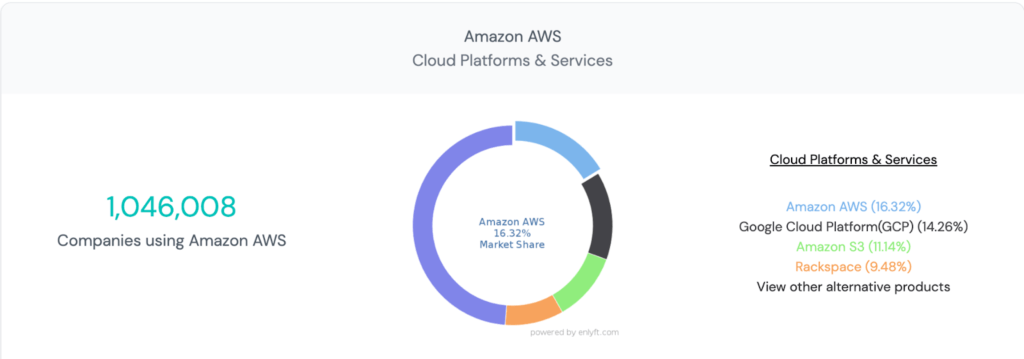
Graphs provided by enlyft.com
Breakdown of Industry Sectors:
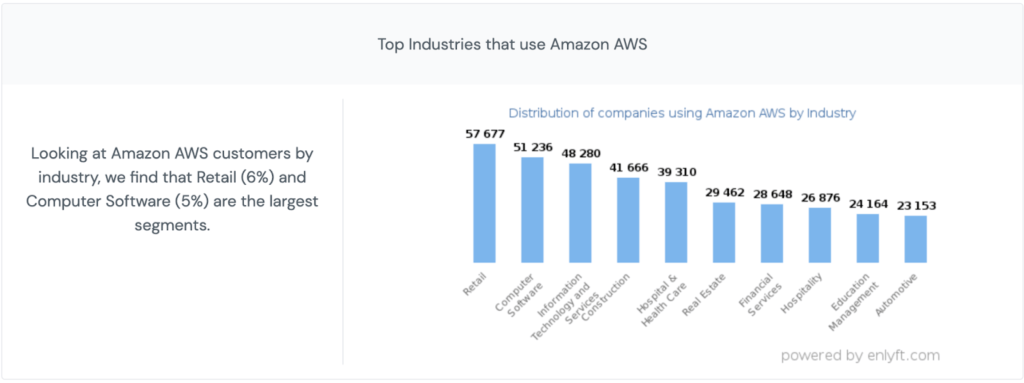
Graph provided by enlyft.com
DigitalOcean

DigitalOcean is an infrastructure as a service provider that is known for specifically targeting small and medium businesses. Its support of Kubernetes clusters and “Droplets” feature. Droplets are another name for DigitalOcean’s virtual machines that anyone can set up with only a few steps.
Cost:
DigitalOcean does not offer a free trial. Pricing for DigitalOcean can be found on the DigitalOcean Pricing Page.
Use Case: DigitalOcean provides developer-friendly features, APIs, and documentation, which make it an excellent choice for small businesses focussed on program testing and deployment. DigitalOcean also performs well when it comes to complex website hosting. Users also claim that the main struggles DigitalOcean faces reside in network coverage and customer support.
As a result, DigitalOcean is great for development-focussed businesses looking to develop, test, and deploy websites and applications on the cloud.
Distribution and Market Share:
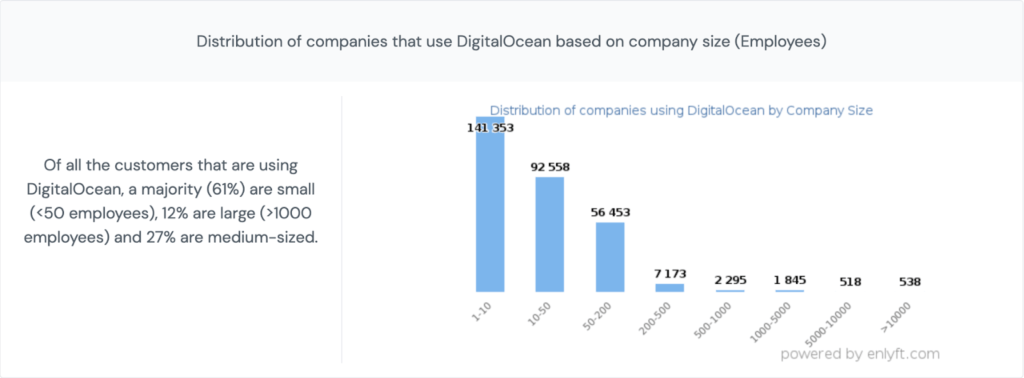
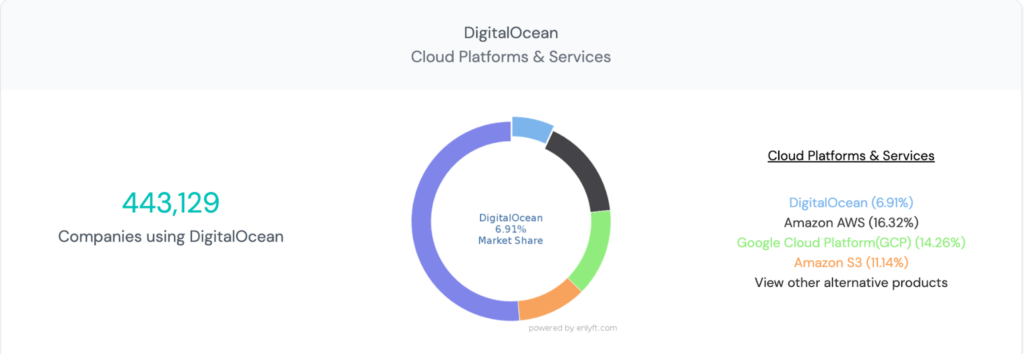
Graphs provided by enlyft.com
Breakdown by Country:
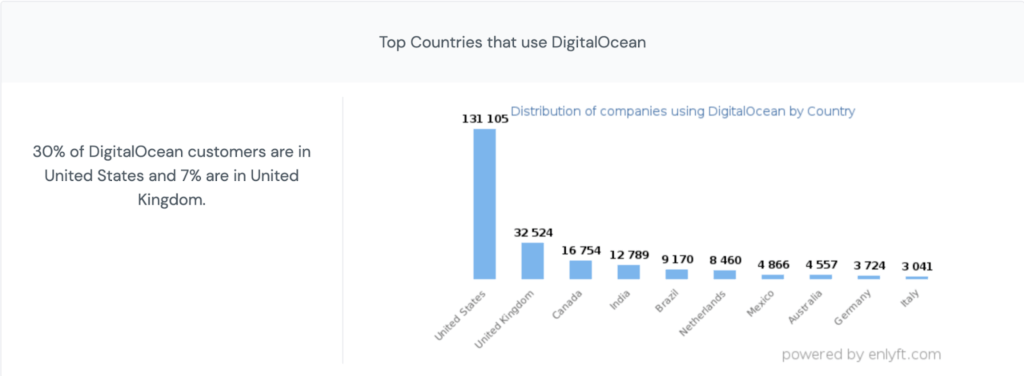
Graph provided by enlyft.com
Google Compute Engine

Google Compute Engine is an infrastructure-as-a-service product offered by Google Cloud which is another major market leader in the cloud computing sector. Google Compute Engine offers a handful of notable features which include:
- Predefined Machine Types
- Custom Machine Types
- Persistent Disks
- Local SSD
- Global Load Balancing
- Batch Processing
- Containers
Google Compute Engine also offers several cloud computing services to help small and medium businesses with development and deployment of business solutions. These services include Google kubernetes engine, serverless computing, cloud storage, web hosting, BigQuery, and artificial intelligence and machine learning processes.
Cost:
Google Compute Engine offers a free trial. Google offers a pricing list for its Compute Engine services.
Use Case: Google Compute Engine is another good all around solution for many businesses. Many users have even said Google Compute Engine is comparable to AWS. However, Google is specifically great for collecting and analyzing big data, and being constantly available. Some users have indicated that Google is less user-friendly than AWS or Azure. This means Google Compute Engine is good for more technical analysis use cases.
Distribution and Market Share:
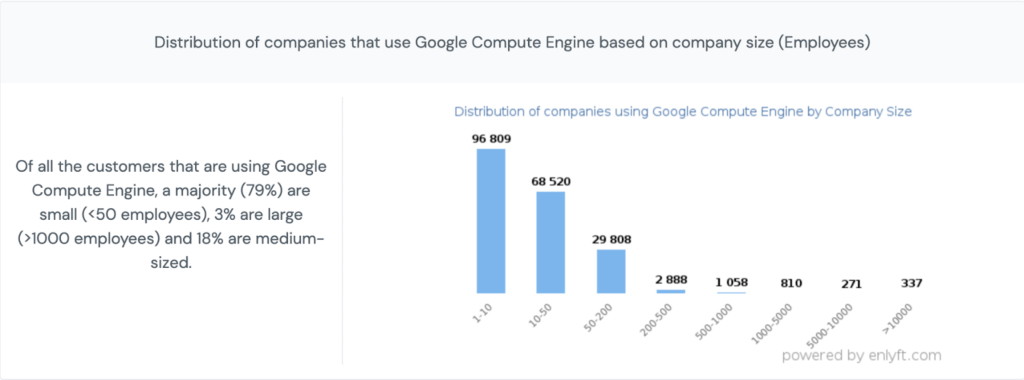
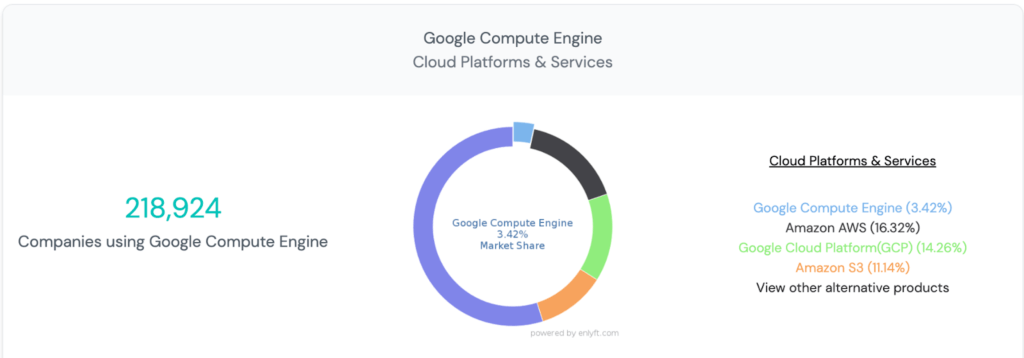
Graphs provided by enlyft.com
Breakdown of Industry Sectors:
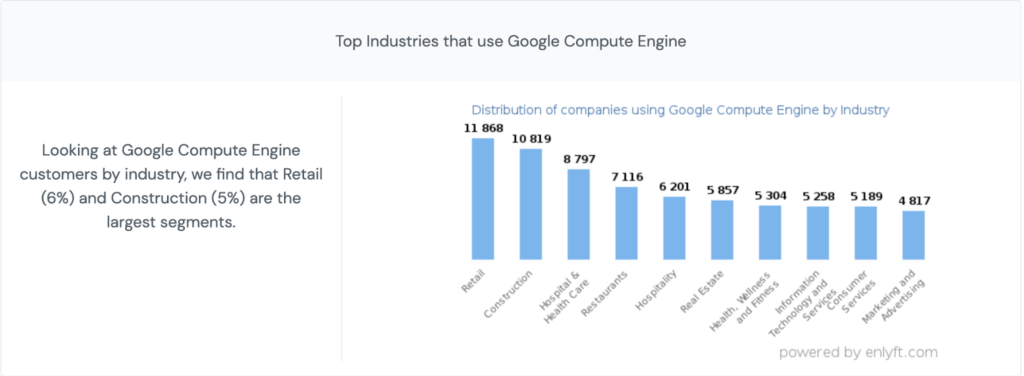
Graph provided by enlyft.com
Microsoft Azure

Microsoft Azure is a cloud computing infrastructure leader from Microsoft. Azure is flexible in that it can support any tool, language, or framework and provides over 100 cloud services. Azure also works well with all cloud deployment types.
Cost:
Microsoft Azure offers a free trial. Azure plans run between $29/month and $1,000/month. A list of Microsoft Azure plans and prices can be found here.
Features:
Azure is known for its security protocols, flexibility and scalability, and hybrid cloud use cases. Azure is also integrated with Microsoft, giving it a wide range of application and program integrations. This means it plays well with many other tools that might already be used by a small business.
It’s important to note the learning curve associated with Azure. Azure requires a level of technical knowledge to look after the infrastructure and to upgrade it as needed. This makes it somewhat difficult for nontechnical users to pick it up.
Use Case: Microsoft Azure is strong in provisioning infrastructure pieces, backing up data, and storing data. It also does a good job of taking in data and analyzing it, making it a good solution for businesses that need easy provisioning and disaster recovery features. Users have also stated that Azure falls a bit short when it comes to pricing and support resources.
Distribution and Market Share:
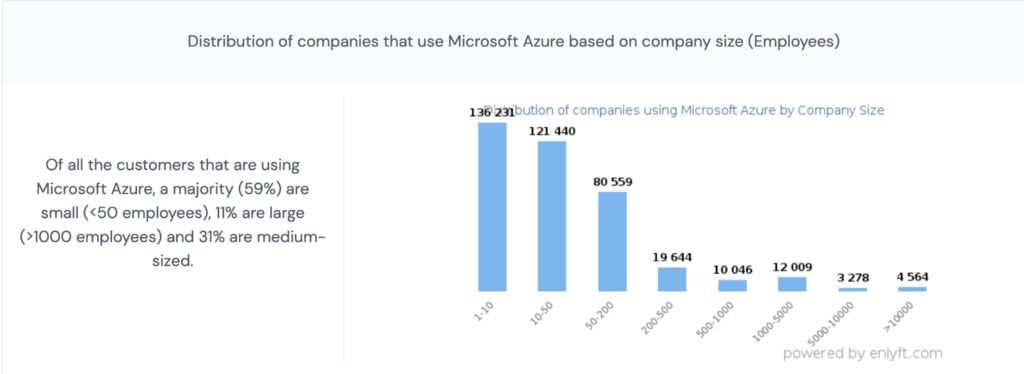
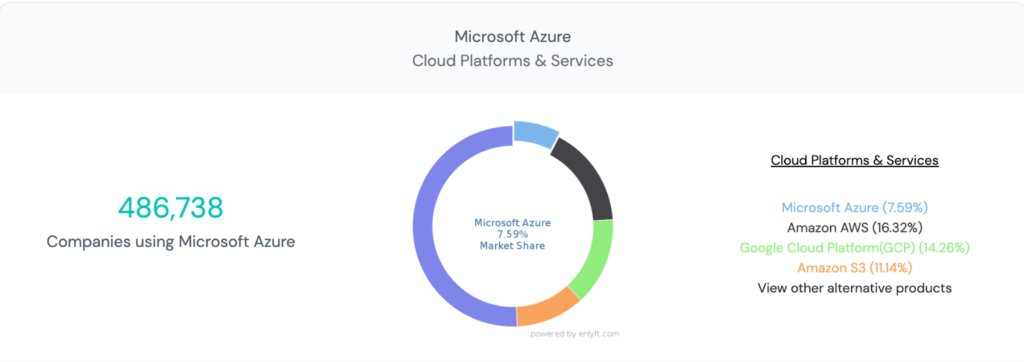
Graph provided by enlyft.com
Breakdown of Industry Sectors:
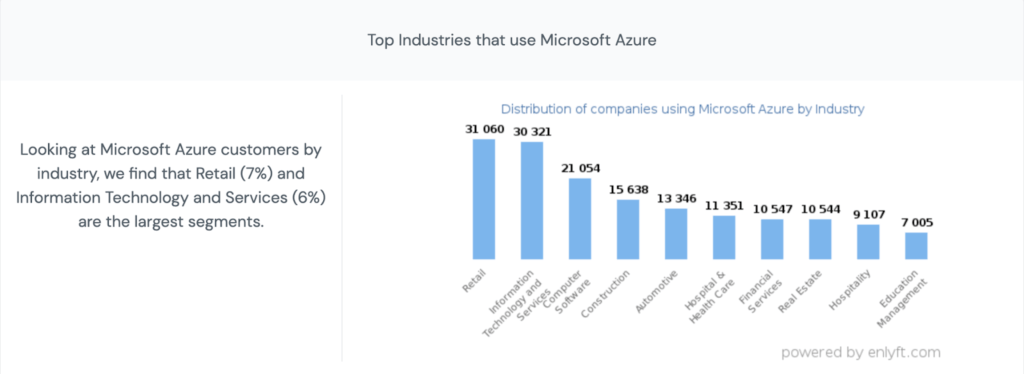
Graph provided by enlyft.com
Additional Information
If you’re looking for more information on Infrastructure as a service software, you’re in luck! Click here to explore reviews for all the IaaS products on TrustRadius.
For those that have used any of the platforms discussed here, please leave a review to help other buyers make informed decisions.
Was this helpful?
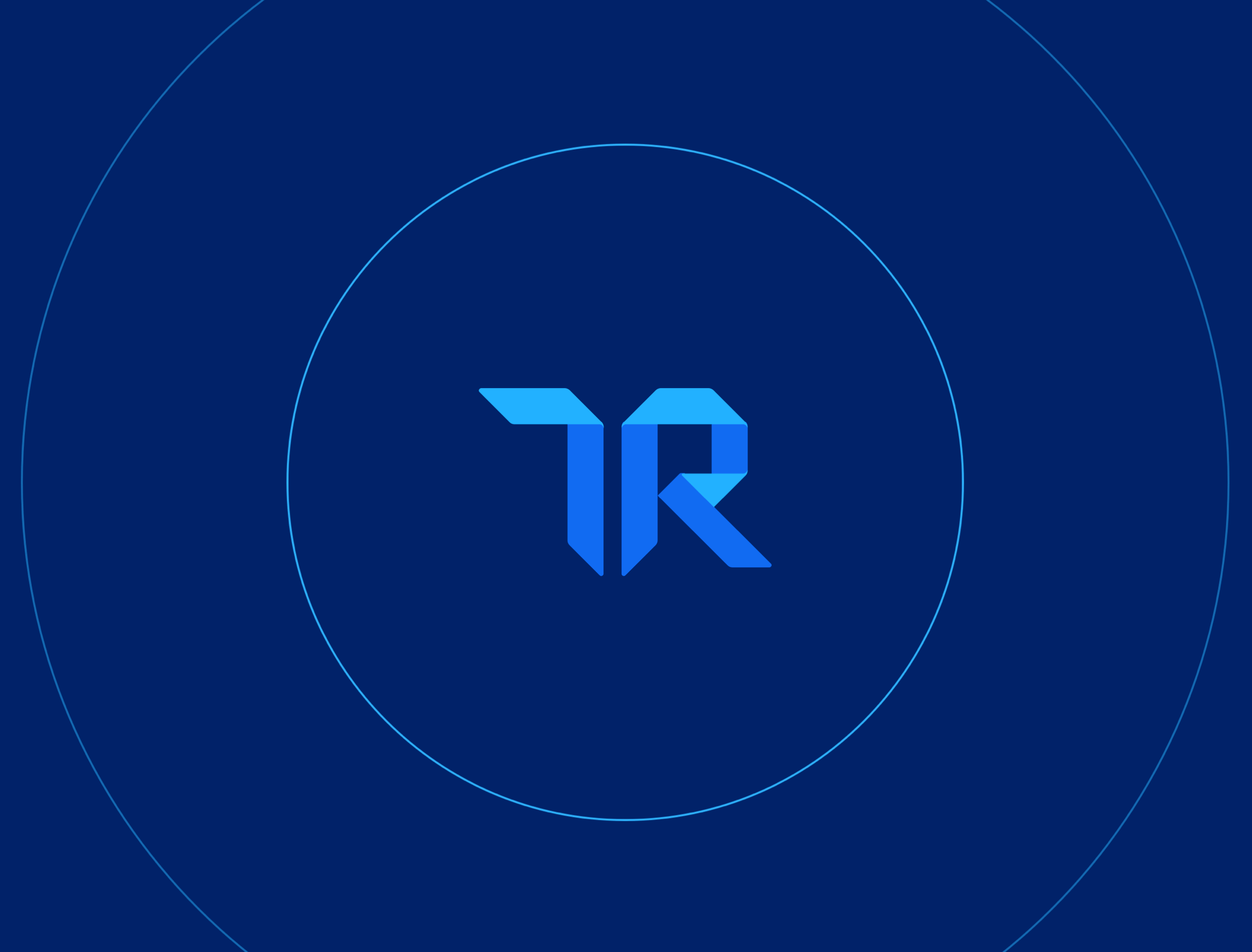
Looking for your next IaaS solution? Click here to read READ reviews from users like you!
